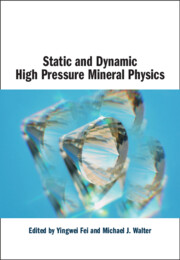Book contents
- Static and Dynamic High Pressure Mineral Physics
- Static and Dynamic High Pressure Mineral Physics
- Copyright page
- Contents
- Contributors
- 1 Introduction to Static and Dynamic High-Pressure Mineral Physics
- 2 Development of Static High-Pressure Techniques and the Study of the Earth’s Deep Interior in the Last 50 Years and Its Future
- 3 Applications of Synchrotron and FEL X-Rays in High-Pressure Research
- 4 Development of Large-Volume Diamond Anvil Cell for Neutron Diffraction: The Neutron Diamond Anvil Cell Project at ORNL
- 5 Light-Source Diffraction Studies of Planetary Materials under Dynamic Loading
- 6 New Analysis of Shock-Compression Data for Selected Silicates
- 7 Scaling Relations for Combined Static and Dynamic High-Pressure Experiments
- 8 Equations of State of Selected Solids for High-Pressure Research and Planetary Interior Density Models
- 9 Elasticity at High Pressure with Implication for the Earth’s Inner Core
- 10 Multigrain Crystallography at Megabar Pressures
- 11 Deformation and Plasticity of Materials under Extreme Conditions
- 12 Synthesis of High-Pressure Silicate Polymorphs Using Multi-Anvil Press
- 13 Investigation of Chemical Interaction and Melting Using Laser-Heated Diamond Anvil Cell
- 14 Molecular Compounds under Extreme Conditions
- 15 Superconductivity at High Pressure
- 16 Thermochemistry of High-Pressure Phases
- Index
- References
10 - Multigrain Crystallography at Megabar Pressures
Published online by Cambridge University Press: 03 August 2023
- Static and Dynamic High Pressure Mineral Physics
- Static and Dynamic High Pressure Mineral Physics
- Copyright page
- Contents
- Contributors
- 1 Introduction to Static and Dynamic High-Pressure Mineral Physics
- 2 Development of Static High-Pressure Techniques and the Study of the Earth’s Deep Interior in the Last 50 Years and Its Future
- 3 Applications of Synchrotron and FEL X-Rays in High-Pressure Research
- 4 Development of Large-Volume Diamond Anvil Cell for Neutron Diffraction: The Neutron Diamond Anvil Cell Project at ORNL
- 5 Light-Source Diffraction Studies of Planetary Materials under Dynamic Loading
- 6 New Analysis of Shock-Compression Data for Selected Silicates
- 7 Scaling Relations for Combined Static and Dynamic High-Pressure Experiments
- 8 Equations of State of Selected Solids for High-Pressure Research and Planetary Interior Density Models
- 9 Elasticity at High Pressure with Implication for the Earth’s Inner Core
- 10 Multigrain Crystallography at Megabar Pressures
- 11 Deformation and Plasticity of Materials under Extreme Conditions
- 12 Synthesis of High-Pressure Silicate Polymorphs Using Multi-Anvil Press
- 13 Investigation of Chemical Interaction and Melting Using Laser-Heated Diamond Anvil Cell
- 14 Molecular Compounds under Extreme Conditions
- 15 Superconductivity at High Pressure
- 16 Thermochemistry of High-Pressure Phases
- Index
- References
Summary
Applications of synchrotron X-ray diffraction techniques have enabled crystallographic characterization of pressure-induced phase transitions in diamond anvil cells (DACs) at megabar pressures. Accurate determination of high-pressure structures is crucial for understanding all other pressure-induced property changes. This chapter discusses current capabilities, technical challenges, and future perspectives of the multigrain techniques for high-pressure studies. Through single-crystal structure analysis of seifertite SiO2 at 129 GPa, we conclude that single-crystal structure determination and refinement is possible in general cases at megabar pressures. A nearly full convergence of the structure can be achieved applying the multigrain method, and high-quality crystallographic data can then be obtained. In addition, multigrain indexation can be applied for fast online analysis of multiphase systems during synchrotron sessions. Future development of software will certainly promote wide application of the multigrain techniques. The multigrain capabilities can be further extended to multimegabar pressures. Combination of in situ X-ray powder diffraction, multigrain indexation, and single-crystal structure determination on individual grains provides new opportunities to characterize new phases at megabar pressures and beyond.
- Type
- Chapter
- Information
- Static and Dynamic High Pressure Mineral Physics , pp. 221 - 238Publisher: Cambridge University PressPrint publication year: 2022

